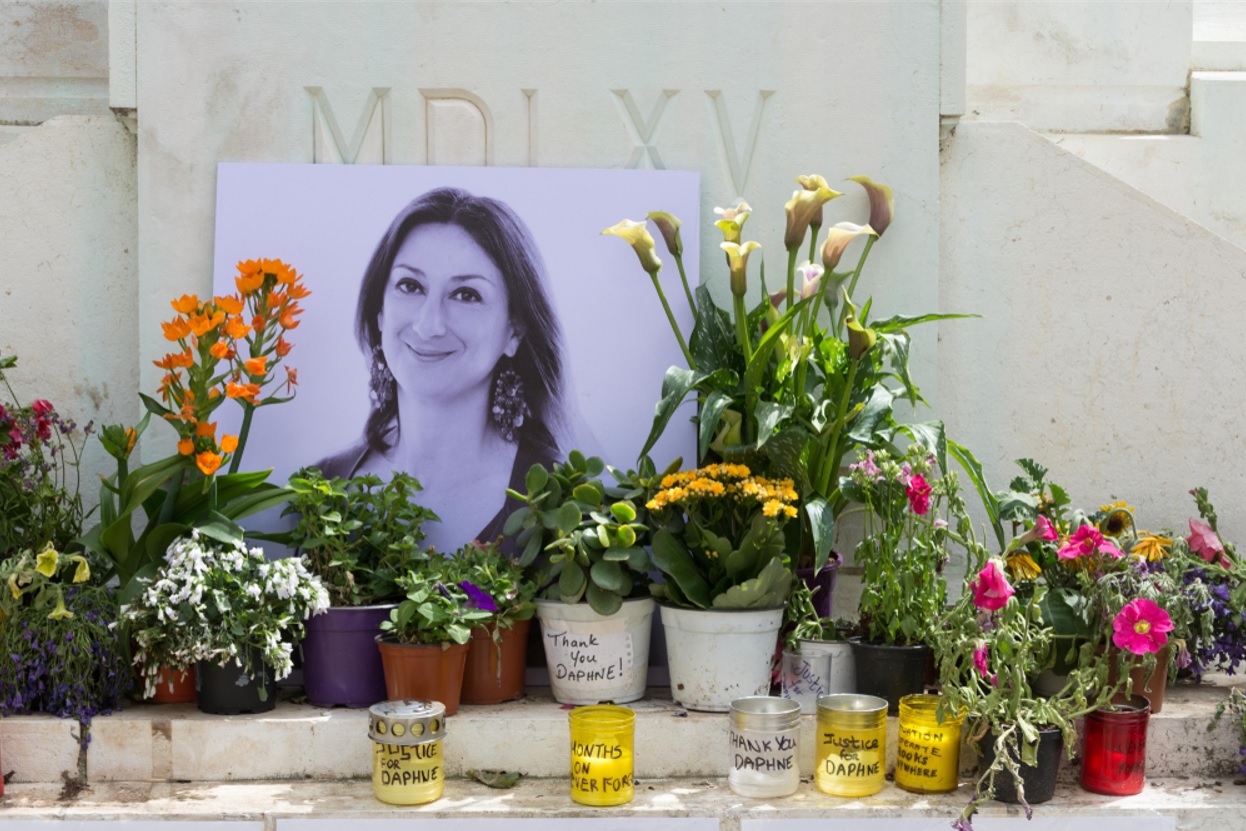The International Press Institute (IPI) today marks the sixth anniversary of the assassination of Maltese journalist Daphne Caruana Galizia, pays tribute to her family and colleagues who continue the long fight for justice, and stresses the importance of ending impunity and securing systemic reforms to the media landscape which ensure such a tragedy is never repeated.
IPI Executive Director Frane Maroević said: “Today the first thoughts of IPI and our global network are with Daphne’s family, who for six years have fought with remarkable determination to ensure that those responsible for ordering, planning and carrying out the car bomb attack near their home on 16 October 2017 do not evade justice.
“Their courage is an inspiration to IPI and the journalistic and media freedom community across the world. IPI stands with them and will continue efforts both to secure full justice for Daphne’s murder and for reforms to the Maltese state which protect journalists and bolster free and independent journalism.”
To date, the two hitmen brothers, George and Alfred Degiorgio, are behind bars serving 40 years sentences for executing the murder. The middleman was previously sentenced to 15 years but secured a plea bargain to provide evidence against those who ordered the hit.
IPI was in Valletta at this time last year along with other international press freedom organizations to witness the hitmen switch their pleas and receive their sentences. While this represented an important milestone, impunity for the assassination will only end when all those responsible are prosecuted to the fullest extent of the law.
The alleged mastermind, Yorgen Fenech, an influential Maltese business owner with deep links to government officials, has pleaded not guilty of complicity in the contract killing and is due to stand trial early next year. IPI will also monitor this trial.
While ensuring that all those involved in the chain of command in the assassination are brought to justice remains the principal objective, ensuring that recommendations set out in the report of the Public Inquiry into Daphne’s murder are implemented in full has always been, and remains, vital for accountability and ensuring such a tragedy is never repeated.
As we mark the anniversary, IPI notes that while the reforms of the media landscape outlined in the government’s white paper – which are due to be presented to parliament in the coming weeks – are an important step in the right direction, many of the provisions fail to meet international standards and must be strengthened.
The media reform has been rushed and the secondary public consultation conducted by the government-appointed Media Expert Committee has regrettably resembled a box ticking exercise for draft laws for which the composition appears already to have been largely decided by the government.
IPI shares the recent concerns expressed by the Council of Europe’s Commissioner of Human Rights that the proposed legislative changes, if passed in their current form, would fall short of international standards. Anti-SLAPP legislation in particular must not be watered down. We also share the serious disappointment outlined by the Daphne Foundation about the apparent dismissal by the Prime Minister of the recommendations aimed at restoring the rule of law.
Six years later, the fight to tackle the toxic culture of impunity at the highest levels of government and address root and stem the conditions which allowed Daphne’s killers to believe they could get away with murdering one of the country’s best-known journalists remains an uphill battle. Yet one IPI remains fully committed to helping secure.
Today, IPI honours Daphne and her family and refocuses our attention on the task of securing systemic reforms which protect journalists and foster an enabling environment for free and independent journalism in Malta.
Malta: Press freedom groups urge PM to deliver strong media law reforms
Malta: Lack of proper public consultation affects the quality of media laws
Malta: Court sentences hitmen to 40 years each for role in assassination of Daphne Caruana Galizia
🇲🇹#Malta: IPI today marks 6th anniversary of assassination of #DaphneCaruanaGalizia, pays tribute to her family & colleagues who continue the long fight for justice, & stresses the importance of ending impunity and securing systemic reforms. Statement👇https://t.co/CKpnxRLqY0 pic.twitter.com/iNf9EXaaFd
— IPI – The Global Network for Independent Media (@globalfreemedia) October 16, 2023
This statement by IPI is part of the Media Freedom Rapid Response (MFRR), a Europe-wide mechanism which tracks, monitors and responds to violations of press and media freedom in EU Member States, Candidate Countries, and Ukraine. The project is co-funded by the European Commission.




